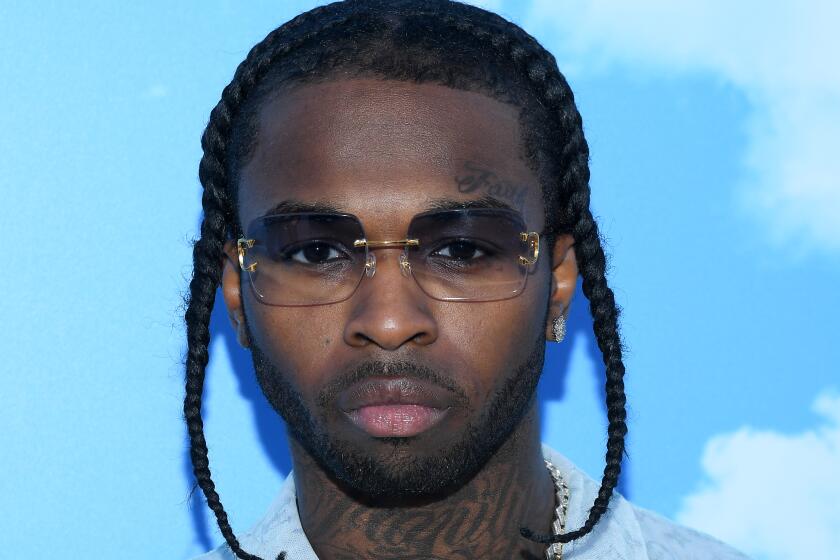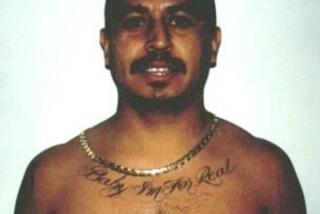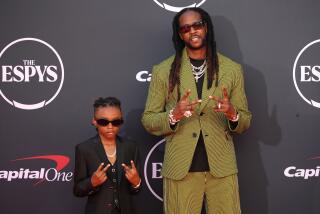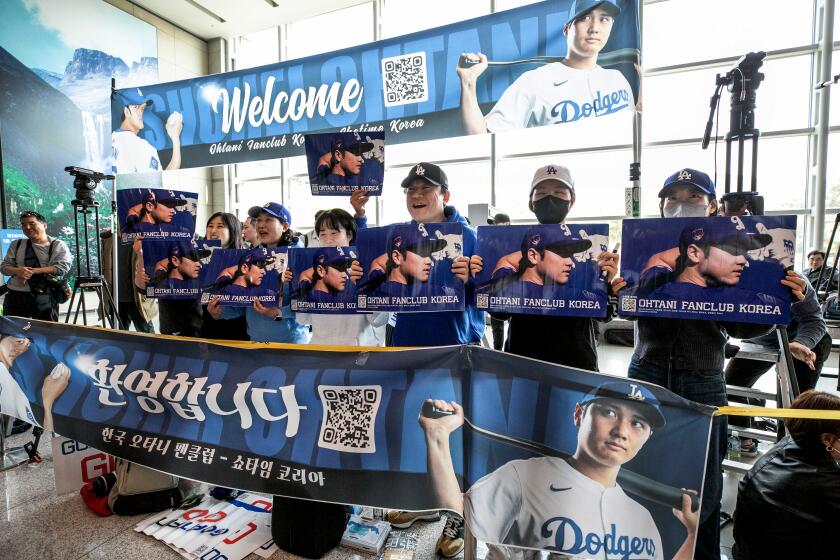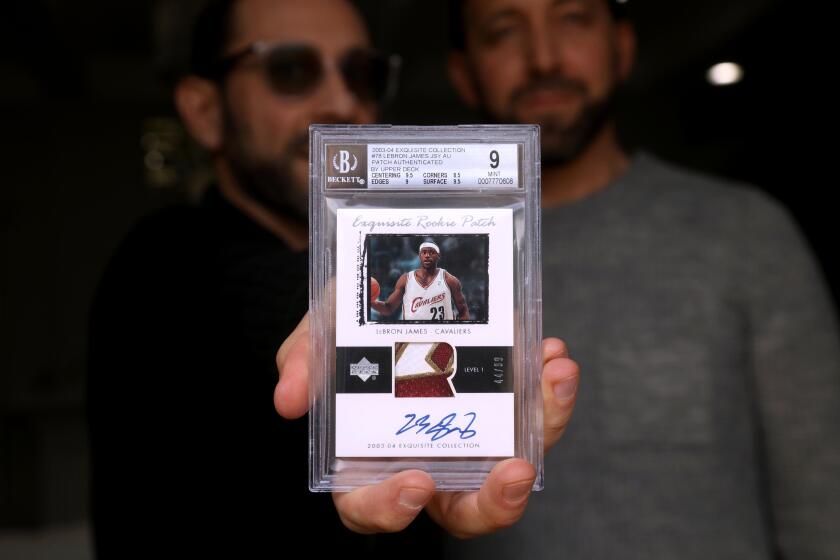A rising rapper, an ill-fated Instagram post and a killing in the Hollywood Hills
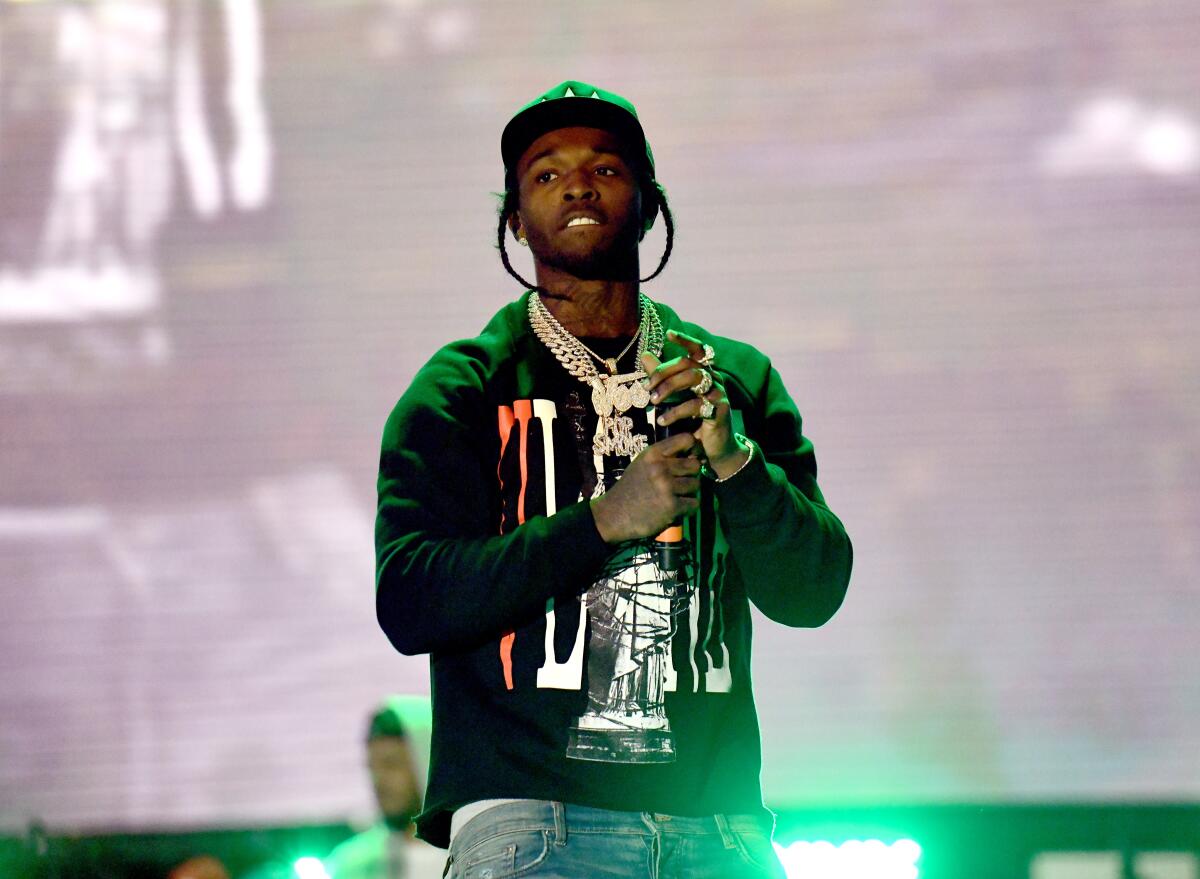
At 2 a.m., a black BMW rolled past a house the rapper Pop Smoke was renting in the Hollywood Hills.
The driver circled back and stopped. A security camera across the street captured a passenger getting out and sneaking toward the back of the house before returning a minute later. The car sped off.
The budding rap star was a few miles away at a recording studio on Sunset Boulevard. He returned two hours later and again a car pulled up — an Infiniti sedan with its headlights off. This time, four people emerged and slipped into the shadows along the side of the house.
Ten minutes later, three of them ran back into the camera’s frame. The footage showed the fourth walk out the front door holding a purse and a gun.
Inside, the musician lay sprawled at the foot of a staircase, dying from a gunshot wound to the chest.
Rising Brooklyn rap star Pop Smoke was killed in a Hollywood Hills home invasion. His musical legacy, though brief, was already secured.
The death of Pop Smoke, whose real name was Bashar Barakah Jackson, stunned the music world in February of last year. Now, details of the slaying and how detectives tracked his alleged killers have come to light.
In court last week, Los Angeles Police Department detectives described a home invasion they allege spiraled quickly into murder. A heist conceived by teenagers, the crime was as brazen as it was pointless — a killing that robbed the rap world of one of its brightest young artists, while netting the alleged killers a watch they sold for just $2,000. Dead at 20, Jackson would not know the breadth of the critical acclaim and commercial success his music received after he was gone.
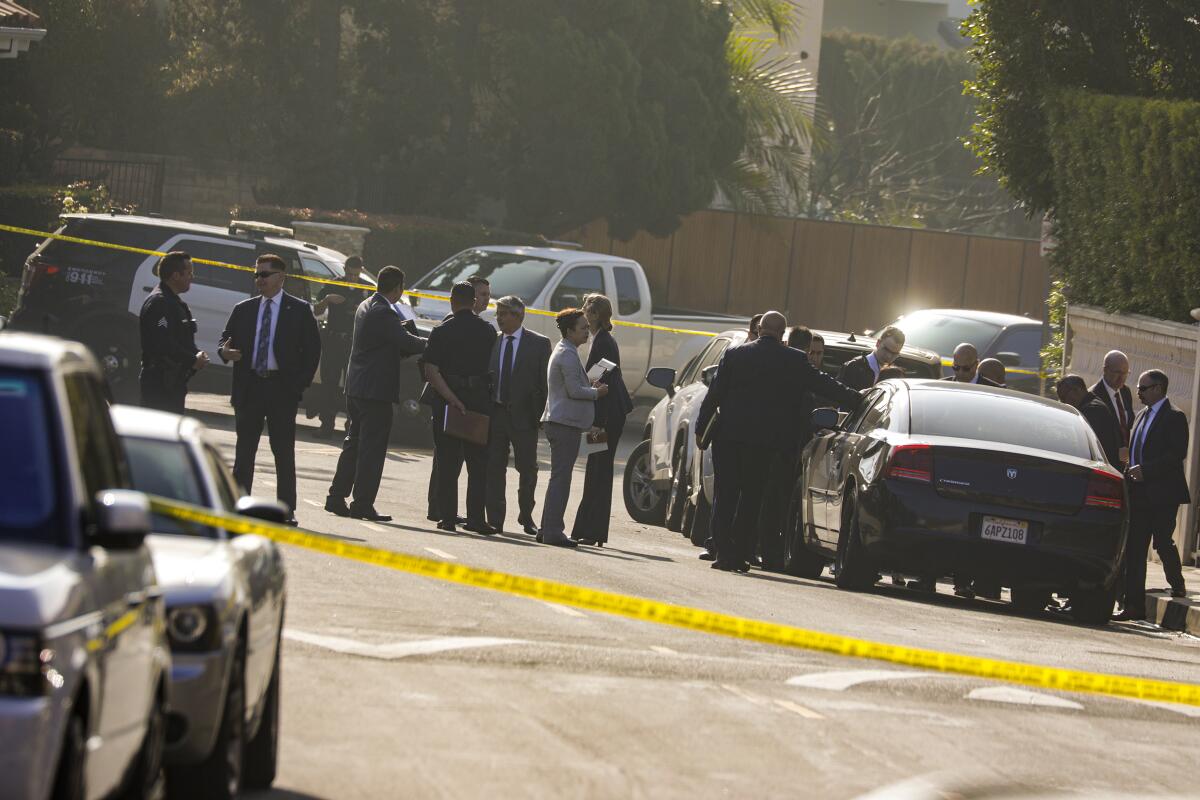
::
A few hours after the killing, Frank Flores and Carlos Camacho, detectives with the LAPD’s Robbery-Homicide Division, headed to the crime scene on Hercules Drive.
Jackson, who lived in New York City, had been staying at the home during a four-day trip to Los Angeles. Walking through the rooms, Flores noted three 9-millimeter shell casings on the floor upstairs. In the kitchen, the detective found a black gift bag from Amiri, a luxury clothier Jackson often referenced in his songs. When the bag arrived a day earlier, Jackson posted a picture of it on Instagram that exposed the house address on a label. Spotting the post with alarm, a talent manager for the rapper’s record label had asked him to take it down.
When they reviewed footage from surveillance systems at homes on the street, the BMW and the Infiniti piqued their interest, Flores and Camacho testified. They could discern parts of the license plates and through DMV records learned both cars were registered to a 19-year-old named Corey Walker, according to Flores’ testimony.
A judge signed off on a warrant that gave the detectives access to a Google account linked to an email address Walker had provided when he bought the Infiniti.
In the hours before and after Jackson was killed, Flores testified that someone who was logged in to the account made several searches of interest to the detectives. At 2:45 a.m., the account’s user searched the house’s address and visited the LAPD’s website, he said. At 4:08 a.m., the user looked up the address on the real estate website Zillow, which features several photos of the inside of the house.
At 5:15 a.m., about an hour after the shooting, an internet search of “Rolex oyster perpetual datejust” was made. And just before 8 a.m., the user queried “breaking news LA” and checked KABC-TV Channel 7’s breaking news page, Flores said. TMZ had first reported the rapper’s death earlier that morning.
The detectives got another search warrant for Walker’s phone records, which allowed them to retrace his movements by charting the cell towers off of which his phone had pinged.
The morning Jackson was killed, Walker’s phone exchanged calls with a number associated with a 17-year-old boy, said Sean Hansen, an LAPD detective who specializes in analyzing cell tower records. The Times typically does not name juvenile defendants. At 1:34 a.m., both teenagers’ phones were hitting off a tower on Florence Avenue in South Los Angeles, but by 2:04 a.m., their phones were in contact with a tower on Mulholland Drive in the Hollywood Hills, the detective testified.
Then, about 90 minutes later, their phones again pinged off towers in South Los Angeles, Hansen said. Half an hour later, their phones were hitting off towers on Mulholland Drive, Laurel Canyon and Hollywood Boulevard, the detective testified.
Though they do not reveal the precise locations of the teenagers’ phones the morning of Feb. 19, 2020, the records offer a rough sketch of their movements, Hansen said: South Los Angeles to the Hollywood Hills, back to South Los Angeles, back to the hills.
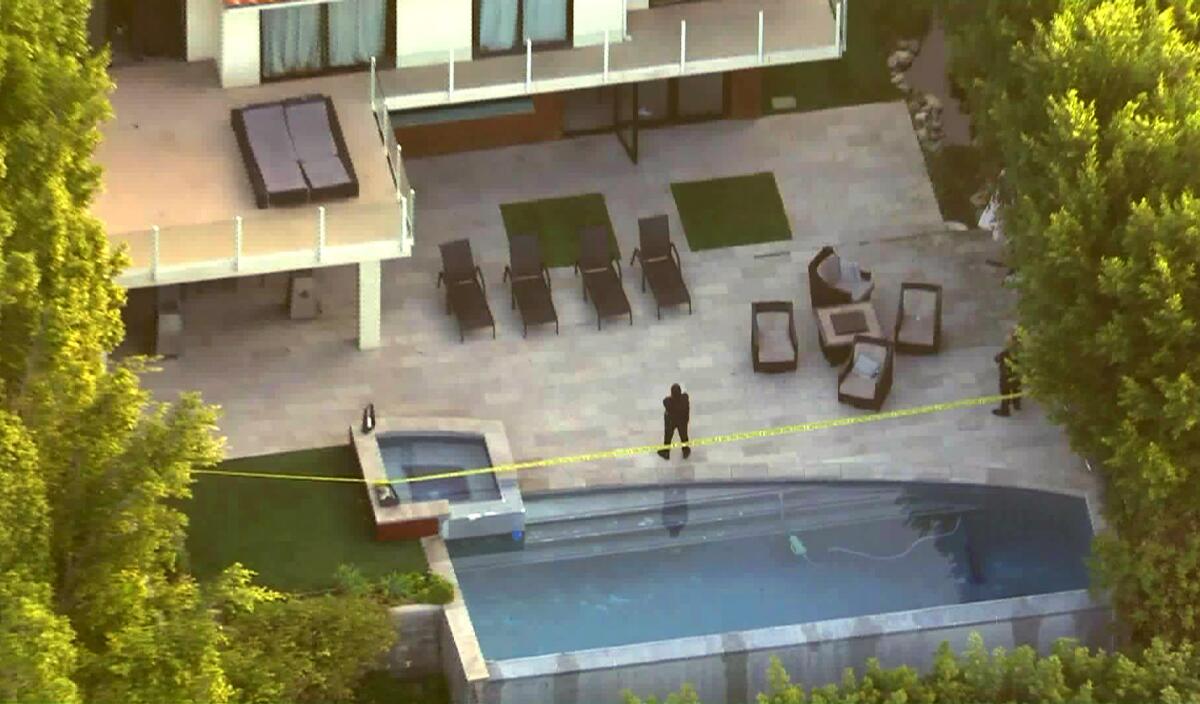
::
After a night at EastWest Studios in Hollywood, Jackson climbed into a white Range Rover with his childhood friend, Michael Durodola, and Amelia Rose, a woman he had met that night, for the short drive back to the house. Rose and Jackson went upstairs to the master bedroom, and Durodola to a room down the hall, Det. Christian Carrasco testified.
The first official album from late Brooklyn rapper Pop Smoke features a dizzying array of guests that threaten to overwhelm his own formidable star power.
At some point in the early morning, Jackson went into a bathroom off the bedroom to take a shower, Rose told Carrasco. She was lying in bed, half-undressed, when she noticed the curtains stirring.
Four or five people burst into the room. They were wearing ski masks. One pointed a gun at her head.
“Shut the f— up,” she recounted him saying, according to Carrasco. “Do you want to die?”
As he grabbed her phone and rifled through her purse, the others rushed into the bathroom. Rose told the detective she heard sounds of a struggle, then Jackson scream. He ran into the bedroom and she heard a “loud pop,” Carrasco testified. Jackson fell to the ground and two of the intruders began to kick him.
Jackson pulled himself up and ran downstairs. The sound of two more gunshots rang through the house. When Rose emerged from the bedroom, she told the detective, she saw Jackson lying at the foot of the staircase in the foyer. She began to scream.
Durodola had awoken with the sound of the first shot, Carrasco testified. He went out onto a wraparound balcony and peered through a sliding glass door into Jackson’s room. Not seeing his friend, Durodola ran downstairs and saw Rose next to Jackson’s body, screaming. He called 911 and started chest compressions on his friend, Carrasco testified. An ambulance rushed Jackson to Cedars-Sinai Medical Center, where he was pronounced dead.
::
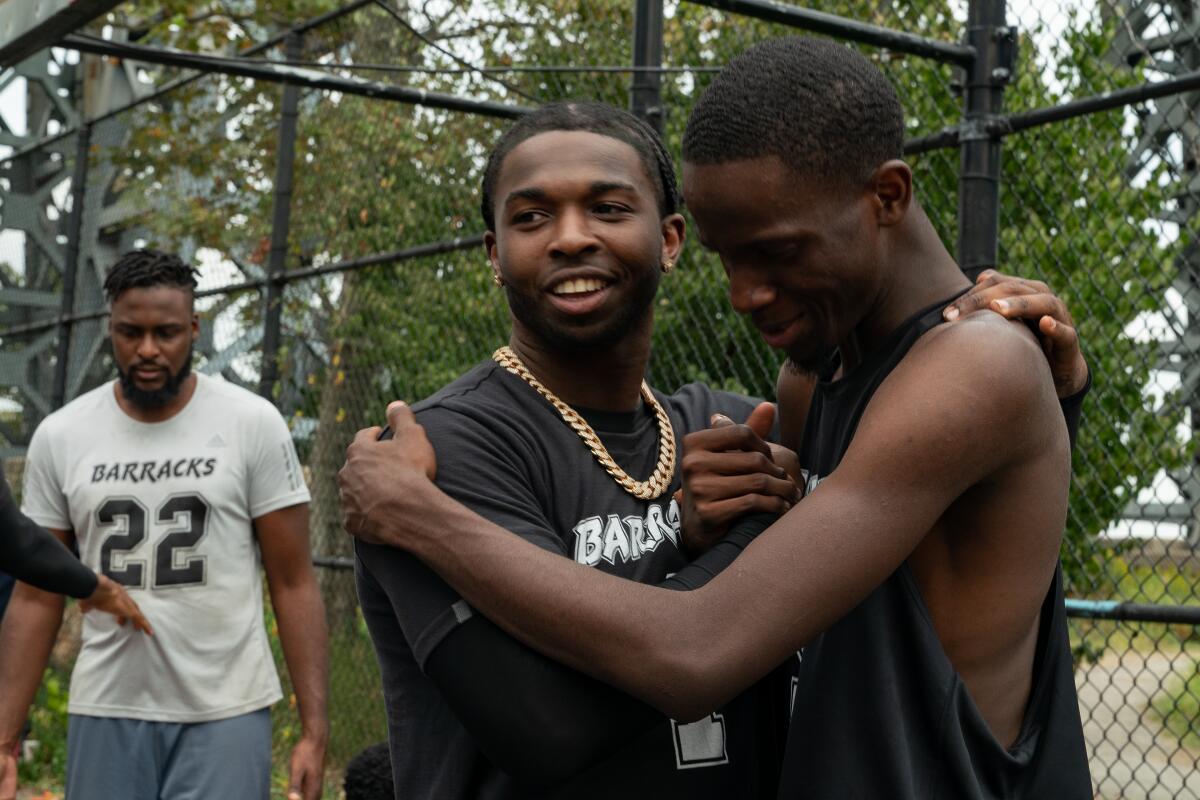
Despite the cellphone and internet records, detectives didn’t have enough hard evidence to make arrests in the case. Then, three months after the killing, they eavesdropped on a firsthand account of what happened, Camacho testified.
A 15-year-old boy was arrested May 21 in an unrelated case and placed in a cell rigged with hidden recording devices. Investigators listened as the boy told his cellmate he’d taken part in robbing Jackson and fired the rounds that killed the rapper, Camacho testified.
After seeing Jackson’s Instagram post of the bag that revealed his address, the teen and some friends hatched a plan to rob Jackson of his thick gold link chain and diamond-studded watch, according to Camacho.
When Jackson put up a fight, the boy said, he’d pistol-whipped the rapper, then shot him three times in the back with a 9-millimeter Beretta, Camacho testified. The teenager said they made off with only the watch, which they sold for $2,000, according to Camacho.
Six weeks later, Walker was arrested; he too was placed in a cell wired for recordings with a cellmate who told Walker he was a gang member but in fact was a plant for the police, Camacho testified.
Walker introduced himself as a member of the 74 set of the Hoover Criminals, a South Los Angeles street gang, Camacho testified. The detective said Walker recounted to his cellmate how he first drove to Hercules Drive with one other person, who had sneaked around the back of the house to surveil it but reported there were “too many bitches” inside. It is not known whether anyone was in the house at the time.
Walker said he returned later with four “youngsters,” bringing with them gloves, masks and a police scanner, Camacho testified. Seeing there were just two men and a woman inside the house, they decided to go in, Walker said.
According to Camacho, Walker recounted arming two of the teens before they entered the house. Using slang terms for guns, Walker described giving “the heat” to the 15-year-old and “the burner” to “the guy from Stevenson Village,” an apparent reference to another gang, the detective said.
Under cross-examination, the detective acknowledged that Walker said he had told his companions “don’t use my s—,” as he had given them the guns.
Walker, the detective testified, told his cellmate he didn’t enter the home, but he described what happened based on what his companions had told him. Jackson was naked in the shower when they burst in and demanded his jewelry. As he handed it over, someone quipped, “Thank you,” and Jackson rushed at them. One of the attackers pistol-whipped Jackson and the 15-year-old shot him in the chest, Walker said, according to Camacho. Detectives did not address the differing accounts from Walker and the 15-year-old boy of where Jackson was shot.
The teens fled in the Infiniti. Not until they’d returned to South Los Angeles, about 15 to 20 minutes later, did they hear on the police scanner that the first ambulance had arrived at Hercules Drive, Camacho testified.
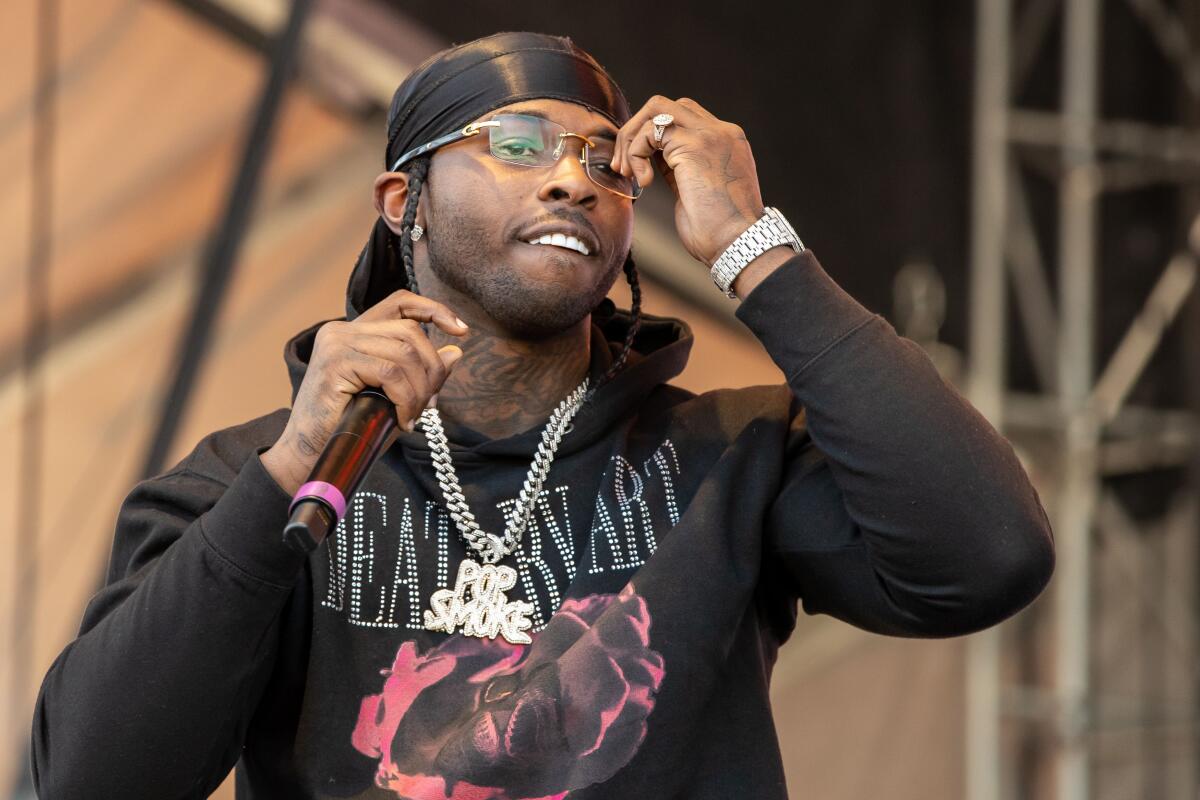
::
Murder, Christopher Darden argued to Judge H. Clay Jacke II, “was never the plan.”
Testimony at Walker’s preliminary hearing had finished, and the man’s defense attorney was asking Jacke to dismiss the most serious charge against his client.
“At most he is a principal in a robbery,” Darden said, pointing to Walker’s statement in the jailhouse sting that he’d told his companions not to use the guns he’d provided.
Deputy Dist. Atty. Hilary Williams argued otherwise, saying Walker had set in motion a home invasion that a reasonable person could see ending in bloodshed. Walker had scouted the target, picked up the others and armed them with guns, she argued. The group easily could have burglarized an empty house, but “they wanted this victim to be home,” Williams said.
Jacke refused to throw out any of the charges and ordered Walker to remain jailed while he awaits trial.
After the hearing, Darden leaned on a railing outside the downtown Los Angeles courthouse and sighed. For all the prosecution’s talk of a coordinated attack, it was, he said, the work of “kids.” “Don’t make him out to be John Gotti.”
Three teenagers are charged in juvenile court with the rapper’s murder, detectives testified. One suspect — the Stevenson Village gang member whom Walker mentioned in the jailhouse sting — remains at large. If convicted, the juveniles would face a fraction of the prison time that Walker, now 20, will receive if he is convicted as an adult.
“Part of the irony in all of this,” Darden said, “is the person who shot him probably won’t stay in prison a day beyond 25. And my client stands to spend the rest of his life in prison. I think that’s fundamentally wrong.”
If Walker is a gang member, as the prosecution contends, it would be a wrenching turn to a life shaped almost from its beginning by gang violence. Walker was 22 months old, riding with his mother in a car near 83rd Street and Avalon Boulevard, when some teenagers issued a “gang challenge,” Darden wrote in court papers.
His mother told them to leave her alone, and they shot her to death. As The Times reported at the time, she died trying to shield her son in the back seat.
More to Read
Start your day right
Sign up for Essential California for news, features and recommendations from the L.A. Times and beyond in your inbox six days a week.
You may occasionally receive promotional content from the Los Angeles Times.
